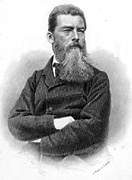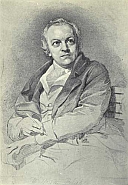
Blake and Feuerbach:
An Odd Couple?
By Ralph Dumain

 |
Blake and Feuerbach:
|
 |
“For the caterpillar, the leaf on which it sits is an infinite world.”
— Ludwig Feuerbach, The Essence of Christianity
The Catterpiller on the Leaf
Repeats to thee thy Mothers grief— William Blake, “Auguries of Innocence”
While Blake and Hegel have been juxtaposed for comparison, and Blake and Marx, not to mention various other philosophers paired with Blake, there is practically nothing in the way of a comparative analysis of Blake and Feuerbach. Here is the only juxtaposition I found when I researched this years ago:
“Theological assumptions in William Blake and Gerard Manley Hopkins: Rebellion or Submission?” by Dr.Vicente Forés López & Cristina Vidal Sales
“The Divine Image” seems to make clear that Blake had a conception of God as a mental representation, a product of man’s imagination. In fact, one of the most radical assortments of Blake is that religion ought not to exist at all, its presence being a consequence of humanity’s fallen condition. “Long before Ludwig Feuerbach and Sigmund Freud, Blake was pondering the mind’s tendency to project and submit to inhuman, oppressive divinities”. [41]
[41] Ryan, Robert. Blake and Religion. The Cambridge Companion to William Blake. Cambridge University Press. 2006. p. 156.
(1) Were we to engage in a serious comparison of Feuerbach and William Blake, the common factor would have to be the concept of nature.
(2) Blake of course only conceptualizes “nature” pejoratively. For him, the entire history of religion (and philosophy) is nature religion, whatever its pretenses.
(3) Feuerbach asserts that all religion derives from dependency on nature. This is by and large not a positive assessment.
(4) Feuerbach declares himself a natural being, without apologies. But he does not make nature an object of veneration. He paints nature in the most brutal or at least most realistic of terms.
(5) So where does Feuerbach go from here? A natural being who in terms of values strives to rise above nature. So how to specify the dialectical relation between man and nature?
(6) For Blake, adaptation of the mind to nature is a root cause of oppressive state religion, which is not merely an individual but a cosmic Fall. By specifying Feuerbach’s (implicit?) view of cultivated man viz. nature, we can manifestly compare him to Blake.
(7) Cf. comparison of Blake to Moses Mendelssohn, comparison of Blake to Jewish Enlightenment (and anti-Semitism).
Tannenbaum, Leslie. ‘”What Are Those Golden Builders Doing?”: Mendelssohn, Blake, and the (Un)Building of Jerusalem’, in British Romanticism and the Jews: History, Culture, Literature, edited by Sheila A. Spector (New York: Palgrave Macmillan, 2002), pp. 79-90. (Abstract/review)
16 March 2012
Ludwig Feuerbach: A Bibliography
Home Page | Site
Map | What's New | Coming Attractions | Book
News
Bibliography | Mini-Bibliographies | Study
Guides | Special Sections
My Writings | Other Authors' Texts | Philosophical
Quotations
Blogs | Images
& Sounds | External Links
CONTACT Ralph Dumain
Uploaded 31 January 2019
©2019-2021 Ralph Dumain